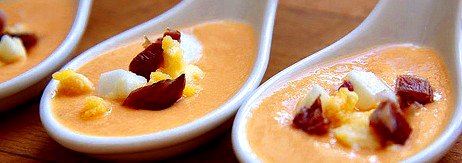Córdoba: the sultana
Cordovan cuisine masterfully combines the excellent local produce with meats and fish, always fresh despite the fact that Córdoba has no coast. It is brought daily, the best and freshest.
Centuries of Muslim rule left a deep mark in Cordovan cuisine, as you will be able to see for yourself once you get exposed to the traditional fare. Córdoba is an important producer of olive oil of the best quality, used in salads, gazpachos, fried dishes and many other specialities.
The oils with Designation of Origin Baena and Priego de Córdoba, used to dress numerous dishes, have a deep and fruity flavour, low acidity and a penetrating aroma. They are ideal for frying. Cordovan cuisine is based on the great local produce.
The mountains provide lamb, pork, beef and game meats. The Guadalquivir river valley and the farmlands provide cereals and pulses. The local farms yield outstanding products like green beans, artichokes, etc. We must not forget the wonderful oxtail hotpot and the lamb casserole, or the traditional flamenquines (fried meat rolls) and honey lamb, a treat for meat lovers.
Local hams and sausages are also excellent, like Valle de los Pedroches Iberian cured ham, the long pork sausage, the salami from Pozo Blanco and the black pudding from Fuente Ovejuna and Hinojosa.

Fresh gazpacho (cold veggie soup) is a delicacy and the Cordovan kind called salmorejo is very special, with other things added like ham, roast rabbit and fried eggs.
Salmorejo. Similar to a traditional tomato gazpacho but richer and smoother, this delightful cold soup is typical of the Cordoba table. In Cordoba, they use dried country-style bread; plain rolls will also work.
Muslim Heritage
Cordovan cuisine is strongly influenced by the centuries of Muslim presence. This shows in its taste for spices like oregano, mint, tarragon and in the use of many foods that were introduced by the Arabs, like rice, spinach and bitter orange.
Another inherited custom is the preference for sweet and sour foods and the use of vegetables not as side dishes, but rather as main courses. Delicious dishes are made with fried courgette, aubergine, alboronía (vegetable stew) and artichokes.
Other dishes from this rich heritage are the traditional perol cordobés (meat and rice casserole) made with ground almonds, raisins and apple chunks and the olla cortijera (chickpea stew).
Desserts and wines
The desserts are also delicious, specially the Cordovan pie, made with puff pastry, pumpkin preserves and cured ham. The use of ham in this dessert is somewhat recent and it has come to replace turkey, who in turn replaced hen, the original filling.
Cordovan pie is very common, but it not by any means the only dessert from this region, where sweets abound. We recommend ring-shaped pastries from Priego, quince jelly from Puente Genil and the meringues from Aguilar.
The Christians also left their legacy in the confectionery of Córdoba, with delicious, rich desserts like perrunas (baked sweet made with flour, lard, orange juice and lemon peel), honey-coated pastries and shortbread.As for wines, in Córdoba you should have the ones with Designation of Origin Montilla-Moriles, which are dry and aromatic.
The latest trend of this D.O. is the making of white table wines with low alcoholic-content, semi-sweet and dry. Pedro Ximénez white wines are also exceptional.




